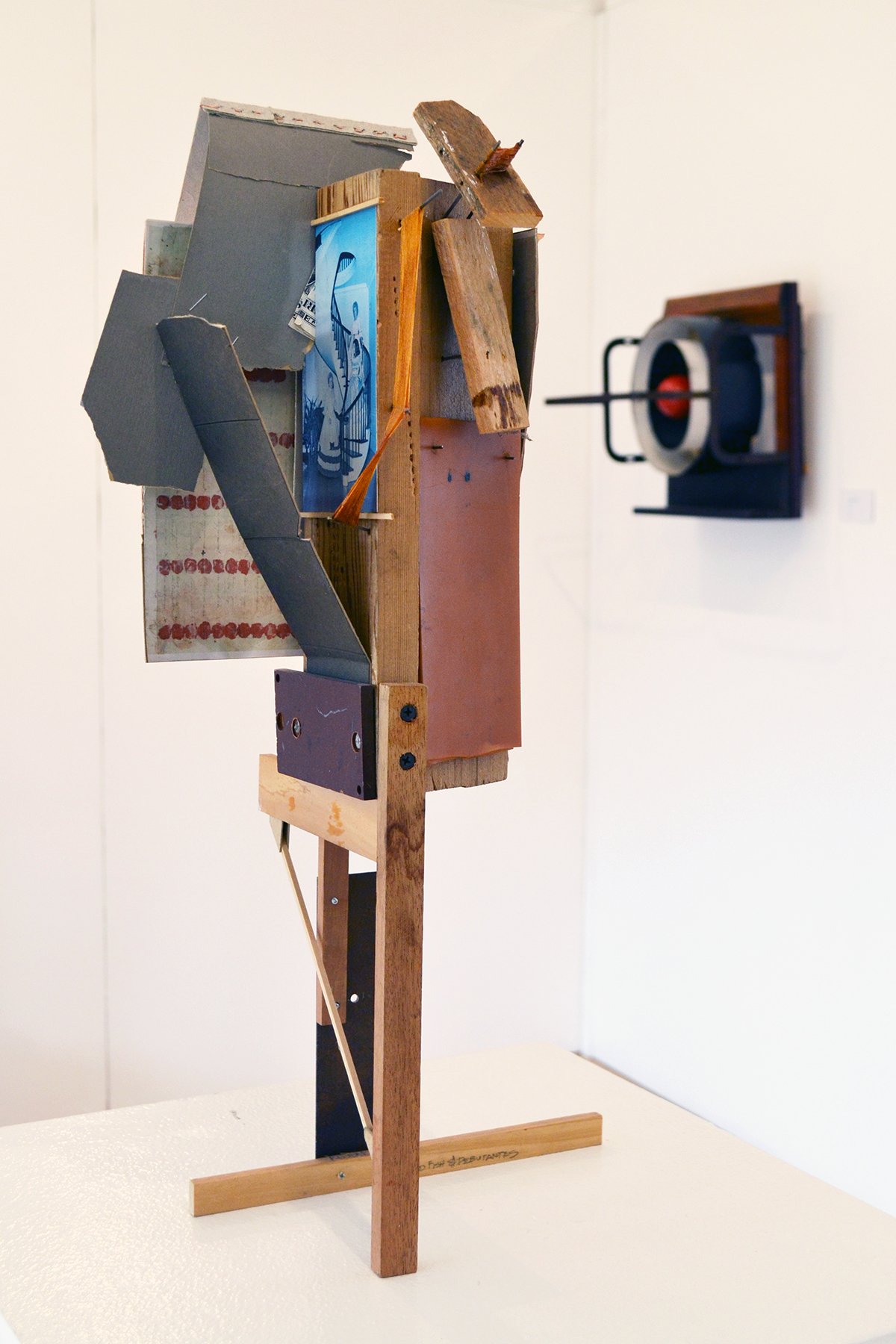Recombobulation
Recombobulation
Curtis Center for the Arts
2349 E. Orchard Road, Greenwood Village, CO 80121
September 6-October 29, 2022
Admission: Free
Review by Paloma Jimenez
A found object artwork is a portal—to an illuminated past, an invented future, and a more lucid present. Recombobulation at the Curtis Center for the Arts brings together eight artists—Sue Blosten, Leigh Cabell, Jimmy Descant, Mark Friday, Deborah Jang, Michelle Lamb, Kelton Osborn, and Floyd Tunson—who expertly transform the things of days gone by into open-ended material narratives.
An installation view of the exhibition Recombobulation at Curtis Center for the Arts. Image by Paloma Jimenez.
Floyd D. Tunson, Synchro-Mesh 51, 2020, mixed media, 26 x 16 x 5 inches. Image by Paloma Jimenez.
The frenetic energy of Floyd D. Tunson’s sculptures greets the viewer near the entrance. His work thrums with immediate presence, but also rewards a closer look at the urgent tactility of the smaller details. Washes of white paint, rusted joints, and chipped enamel coalesce into dimensional forms that exude a joyful and precarious chaos. Synchro-mesh #51 asserts itself as a sort of control board for the group, with a colorful wire tornado and an array of rounded batteries. Detailed in pencil and white paint, the word “CONNECTIONS” forms a bullseye with crimped wires straining outwords. It would be no surprise if a spark emitted from the inner recesses of the piece.
Jimmy Descant, Pass the Hatchet! TOMAHAWK, 2018, Mahjong tiles, utensils, piano hammers, tools, keys, and other objects on a vintage wood desktop, 30 x 22 x 3 inches. Image by Paloma Jimenez.
Different forms of text play an important role in many of the artists’ works, used for graphic emphasis as well as to mark meaning. Mark Friday utilizes found numbers and letters to establish equilibrium. The elements in his concise sculptures achieve the wondrous finality of a correctly solved mathematical equation. Jimmy Descant’s pieces favor sharp edges and frontal clarity, reading as pages in a book of reinvented weapons. Pass the Hatchet! TOMAHAWK spells out its namesake in yellow rectangles, highlighting the artist’s sharp wit and playful approach to dangerous materials. Descant’s methods of affixation function as visual punctuation; screws and nails shine with purpose.
Kelton Osborn, Dead Fish & Debutantes, 2017, wood, cardboard, string, metal, and found objects, 23.5 x 9 x 12 inches. Image by Paloma Jimenez.
Kelton Osborn utilizes more incidental methods of joining. The casual lean of gravity and delicate materials in Dead Fish & Debutantes create a precarious impression, but the thoughtful comedy of the piece is rock solid. A folded dollar bill wedged inside an inner wall of the sculpture feels like a bonus prize. Occupying the back walls, Deborah Jang’s pieces are symphonic. In Welcome Here, brooms and orange reflectors have cleverly united to form an entirely new object with an idiosyncratic function known only by the artist.
Michelle Lamb and Curtis Center workshop students, Recombobulation Interactive Totem, 2022, mixed media, dimensions variable. Image by DARIA.
Michelle Lamb also explores the many ways in which parts can become a whole. Along with the cosmic elegance of her totemic sculptures, she includes an interactive piece that invites the viewer to engage in her particular form of alchemy. The boxes were created by students at the Curtis Center and can be stacked in various configurations on a central pole, inviting a curiosity for the infinite potential of found object art. Navigating this potentiality, Sue Blosten excavates meaning from fragments, using broken teacups and scraps of found imagery to build ecstatic scenes.
Leigh Cabell, The Henry Mountains, 2021, coffee bags, chip bags, folder, envelopes, pasta bag, shopping bag, ice cream bar wrapper, and chocolate chip bag, 8 x 8 inches. Image by DARIA.
Leigh Cabell uses scraps of detritus from daily consumption to create layered scenes on a smaller scale. Food wrappers, packaging, and other discarded materials unite through beaded threads, delicately shifting between various states of opacity. Cabell’s prismatic mini-quilts poetically confront the challenge of a waste-filled world, while championing the persistent beauty of nature.
An installation view of the exhibition Recombobulation at Curtis Center for the Arts. Image by DARIA.
The artists in Recombobulation uncover new mysteries housed in familiar objects. The exhibition celebrates a way of creating that does not prioritize a fixed message, but rather, revels in what might be discovered on an unexpected detour.
Paloma Jimenez is an artist, writer, and teacher. Her work has been exhibited throughout the United States and has been featured in international publications. She received her BA from Vassar College and her MFA from Parsons School of Design.














